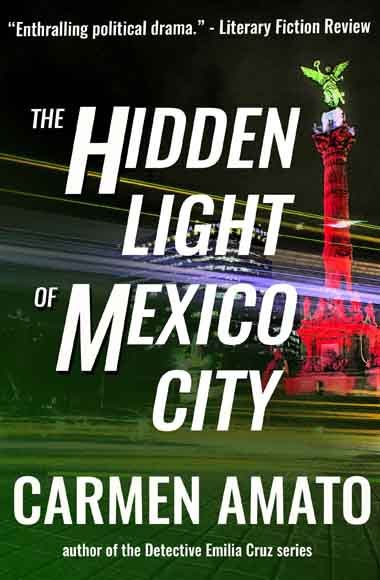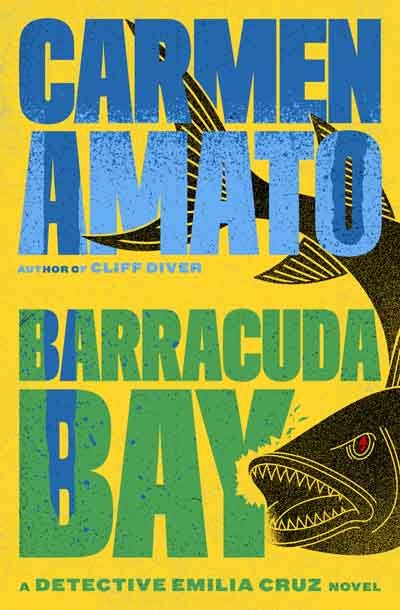Lavadinero is the Spanish word for “money laundering”
That’s just one of the new words David picked up on his recent trip to Panama. Yes, we promise, there will be a trip report about Panama and how we use travel to enhance our books, but today we have something much better:
A guest post from fellow thriller author and 30-year CIA veteran Carmen Amato.
Carmen read our post last week about David’s brush with current events at the Panama Canal and reached out for a chat. By the end of the call, we had her signed up for a guest post about money laundering!
Without further ado, heeeere’s Carmen.
Has this ever happened to you?
You’re the CEO of a major enterprise, with transactions in multiple countries. Demand for your product is sky-high and sales are white-hot, although you do have a number of rivals who want to sell in the same territory and will even steal your inventory on its way to market. You deal with these interlopers with the same violent ingenuity you bring to logistics, distribution, and the challenge of truckloads of cash.
No, this has never happened to you because you aren’t running an international organized crime operation.
Neither am I, although I’m uncomfortably familiar with how they work. I’m Carmen Amato, a 30-year veteran of the CIA.
Now, as a writer of standalone thrillers and the 9-book Detective Emilia Cruz police series set in Acapulco, I’m still unraveling those raw crimes. Using the power of fiction, I take you into a dark office late at night, poring over seemingly obscure records hiding criminal transactions.
Or an interrogation room where the very air smells like sweat and lies.
Or in a car desperately trying to outrun a truckload of cartel killers bristling with more firepower than a small army.
On every page, as in real life when dealing with organized crime, danger is lubricated by cash.
A 3-step washing machine
Enterprises like Mexico’s Sinaloa Cartel run by El Chapo Guzman (now in jail in the US) and the Venezuelan gang Tren de Aragua make money through drug smuggling, human trafficking, extortion, kidnapping, and sex trafficking. Once they have cash in hand from these illicit activities in a foreign country such as the United States, how do they turn it into lavish lifestyles at home in Mexico and Venezuela?
That process is known as money laundering. It generally follows a pattern with 3 steps:
Placement: getting cash into the bottom rung of the financial system using money drafts, smallish purchases of resalable items, cybercurrency buys, online gaming and gambling, etc.,
Layering: moving the money through multiple layers of financial transactions to make tracing its origins difficult, and
Integration: moving the now “clean” money into legitimate high value investments like real estate, yachts, art, and jewelry.
Mexico’s Sinaloa Cartel has had years to perfect these steps
The Sinaloa cartel has been operating for decades, taking in billions of dollars a year which need to be processed in “small” batches. In one example, which US federal law enforcement agencies closed down in April 2023, a sophisticated operation “washed” $16.5 million through multiple financial instruments. The sweeping operation stretched not only across the US-Mexico border but encompassed multiple major US cities.
Sinaloa henchman Enrique Daan Esparragoza Rosas was the leader of the effort. He used a network of shell companies incorporated in Wyoming, created and overseen by Luis Ramirez, a U.S. citizen in Mesa, Arizona.
Why Wyoming? At first glance, the rugged Western state seems an unlikely hideout until you know that the state allows registered agents – in-state representatives – to serve as the public point of contact for LLCs, a business structure that provides personal liability protection to its owners. This means the true owner of the LLC is kept secret. Delaware and Nevada have similar setups.
[Editorial note: Sharp-eyed readers will recall that we employed this anonymous shell company tactic in Order of Battle. We used the state of South Dakota.]
Sarah Beth Felix runs Palmera Consulting, an anti-money laundering advisory firm. She claims that Wyoming made registering anonymous shell companies so easy that foreign crooks “don't have to be physically in Wyoming to hide out in Wyoming.”1
According to the Drug Enforcement Agency’s account:
Ramirez and Esparragoza allegedly directed and facilitated employees of the money laundering organization to travel to cities throughout the United States to pick up bulk cash belonging to narcotics traffickers. The employees picked up the bulk cash in Chicago, Omaha, Boston, New York City, Baltimore, Charlotte, Philadelphia and other cities. Narcotics traffickers delivered bulk cash in amounts of up to $200,000 to the employees in hotel rooms and parking lots. Following the delivery of the illegal money, the criminal organization laundered the funds through the shell companies and then transferred the laundered funds to bank accounts in Mexico.
How to buy influencers, Sinaloa style
In October 2024, Mexico’s disgraced former Minister of Public Security Genaro Garcia Luna was sentenced to over 38 years in prison in the US.2 The sentencing was the final step in a 5-year effort by Mexican and US federal agencies to uncover the amazing breadth of his crimes.
As his country’s top law enforcement official in the 2010’s, Garcia Luna oversaw Mexico’s federal police. At the same time, he took bribes from the Sinaloa cartel.
According to US Homeland Security:
Garcia Luna’s conduct included facilitating safe passage of the cartel’s drug shipments, providing sensitive law enforcement information about investigations into the cartel and helping the cartel attack rival drug cartels . . . In exchange for bribes, the defendant’s Federal Police Force acted as bodyguards and escorts for the cartel, allowing cartel members to wear police uniforms and badges and helping to unload shipments of cocaine from planes at Mexico City’s airport, then delivering the cocaine to the cartel.
Bribe money was handed off to [Garcia Luna] in a variety of locations, including at a “safe house” located in Mexico City where large amounts of cash were hidden in a false wall, a car wash in Guadalajara and a French restaurant in Mexico City across the street from the U.S. Embassy.3
No slouch in the long game department, García Luna took over $50 million he got from the Sinaloa cartel and laundered it through tax havens around the world. Santiago Nieto, head of the Finance Intelligence Unit of Mexico, discovered that bribe money was transferred to “façade companies” which moved the deposits into bank accounts in the US, Barbados, Hong Kong, Israel, Latvia, Panama, the United Kingdom, Cyprus and Curacao.
Tren de Aragua’s less sophisticated tactics
Operating in places with weak civil authority, Venezuela gang Tren de Aragua doesn’t need such elaborate arrangements.
In 2023, InSight Crime reported that the gang has built a far-reaching regional network, establishing a permanent presence in Colombia, Peru, and Chile, with further reports of their presence in Ecuador, Brazil, and Bolivia.4
Some of the money Tren de Aragua made in Chile through trafficking in drugs, sex, and people was transferred back home to its leadership in Venezuela via Western Union and Bitcoin. More indicative of the gang’s brutal style however, was the use of victim families as cut-outs.
Family members of gang victims in Venezuela were forced to let their bank accounts be used as cutouts. Gang members outside Venezuela would wire deposits to those bank accounts. The family member would withdraw the money and hand it over, too terrified of retribution to report the crime. Besides, what were the chances law enforcement was already in Tren de Aragua’s pocket?
Tren de Aragua also spent cash in Chile on motorcycles and other vehicles, which were rented out to migrants and informal food delivery workers. I would not be surprised if this tactic allowed the gang to build a network of informants and foot soldiers and is still practiced as the gang expands in the US.
Show me the money
Long before Gennaro Garcia Luna was brought to trial, my 2012 political thriller THE HIDDEN LIGHT OF MEXICO CITY saw Mexico’s Minister of Public Security striking a deal with an El Chapo-like druglord to buy the country’s presidency. The plot is foiled by his deputy who finds a sketchy real estate transaction that ultimately leads to unusual bank transactions:
Several times a week deposits were being made into four different accounts held in Reynoldo’s name. Each deposit was sizeable but not large enough to cause alarm. No two deposits were the same amount. It always varied; a thousand pesos here, a few hundred pesos there. The deposits appeared to be cash or money order, although some were wire transfers from a business called Montopa in Panama. Withdrawals were made only a little less frequently than the deposits. The withdrawals were never the same amount as any of the deposits and they were all for different amounts but by and large the same amount that was coming in was also going out.
The money withdrawn from Reynoldo’s accounts was appearing within a few days in Hugo’s accounts, the amounts modified by a few hundred pesos each time. About 80 percent of what came into Hugo’s accounts was withdrawn within a week.
Did I inadvertently describe the classic layering scheme that Garcia Luna, the real Minister of Public Security used to move and hide money long before his crimes were made public?
What a coincidence.
A time for creativity?
Criminal organizations are likely to chase more creative ways of laundering money in order to stay ahead of real life investigators as tireless as my characters.
In my latest book, BARRACUDA BAY, available for pre-order now, Acapulco police detective Emilia Cruz ends up a fugitive in Washington DC on her way to uncovering a laundering scheme connected to a US consulate in Mexico.
Embassies and consulates are sovereign territory of the countries they represent. Inside an embassy or consulate, that country’s currency is used as opposed to the currency of the host country. In short, if you buy lunch in the cafeteria of the US Embassy in Mexico City, expect to pay in dollars, not pesos.
A unique financial ecosystem. Is it vulnerable?
No spoilers, but to paraphrase The Two Navy Guys, “I didn’t mean to predict the future. I was just connecting the dots.”
Imitation is the most sincere form of flattery
Did Carmen just finish off a meaty and informative tutorial on money laundering by quoting us back to us and proposing a (hopefully fictional) unique and diabolical money laundering scheme that involved the US government?
<slow clap>
That, ladies and gentlemen, is how a CIA professional gets the job done.
Barracuda Bay, Carmen’s latest Emilia Cruz novel, comes out February 20th at a discounted launch price of $2.99.
Carmen Amato is the author of the 9-book Detective Emilia Cruz mystery series pitting the first female police detective in Acapulco against Mexico's cartels, corruption, and social inequality. Starting with Cliff Diver, the series is a 2-time winner of the Outstanding Series award from CrimeMasters of America and was hailed by National Public Radio as “A thrilling series.”
Her standalone thrillers include The Hidden Light of Mexico City, which was longlisted for the 2020 Millennium Book Award.
A 30-year veteran of the CIA where she focused on technical collection and counterdrug issues, Carmen is a recipient of both the National Intelligence Award and the Career Intelligence Medal. A judge for the BookLife Prize and Killer Nashville’s Claymore Award, her essays have appeared in Criminal Element, Publishers Weekly, and other national publications.
She writes the popular Mystery Ahead newsletter on Substack.
Be happy. Stay healthy. Read (or listen to) a book.
As always, thanks for being a supporter –
David & JR, AKA the Two Navy Guys
PS – Are you looking for the FREE download of Death of a Pawn?
PPS - This email is free, but it's not cheap. If you'd like to show your support, here's where you can find all the Two Navy Guys' books.
PPPS - If you enjoyed this post, you can get it delivered to your inbox every week for free.
How cybercriminals are using Wyoming shell companies for global hacks https://www.reuters.com/technology/cybersecurity/how-cybercriminals-are-using-wyoming-shell-companies-global-hacks-2023-12-12/
Ex-Mexican Secretary of Public Security Genaro Garcia Luna Sentenced to Over 38 Years in Prison https://www.dhs.gov/archive/hsi/news/2024/10/17/ex-mexican-secretary-public-security-genaro-garcia-luna-sentenced-over-38-years
Denuncias contra exsecretario de seguridad de México muestran red de empresas fachada que movió más de 50 millones de dólares en 11 países https://www.univision.com/noticias/america-latina/denuncias-contra-exsecretario-de-seguridad-de-mexico-muestran-red-de-empresas-fachada-que-movio-mas-de-50-millones-de-dolares-en-11-paises
Three Stages in the Construction of the Tren de Aragua’s Transnational Empire https://insightcrime.org/investigations/three-stages-construction-tren-de-aragua-transnational-empire/












There's a lot of fascinating people in the world! Too cool.
Many thanks for the chance to talk money with you all!